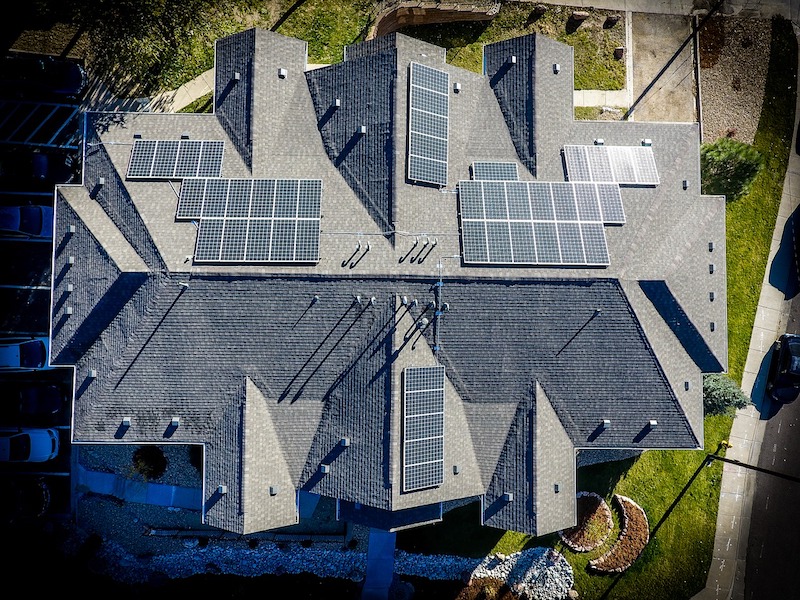California this month became the first U.S. state to require solar panels on almost all new homes.
Most new units built after Jan. 1, 2020, will be required to include solar systems as part of the standards adopted by the California Energy Commission. Estimates are that the mandate will drive up the cost of buying a house by almost $10,000.
The PV-on-house law is a new component of Governor Jerry Brown’s effort to slash carbon emissions by 40% by 2030, and provides a potential roadmap for other states to follow. The U.S. had 10.4 gigawatts of residential solar power at the end of last year, up more than 600% from five years earlier. California’s move will boost the residential solar industry, which started slowing in 2017 after government policy changes and efforts by some companies to shift their strategies.
Installation of a solar system and other energy-efficiency requirements will add about $9,500 to the cost of a new home, according to the California Energy Commission. The cost would be offset by about $19,000 in expected energy and maintenance savings over 30 years, according to the commission.
Related Stories
| Sep 8, 2011
Pilot ISO 50001 Implementations Report Big Energy Savings
The International Organization for Standardization (ISO) recently published ISO 50001 to provide a recognized framework for integrating energy performance into management practices.
| Sep 8, 2011
USGBC Revises Energy Demand Response Credit
Originally launched in 2010, the revised and enhanced Demand Response Pilot Credit establishes guidelines that are anticipated to increase participation in automated energy demand response programs.
| Sep 8, 2011
Water Safety in Buildings Guide Published by World Health Organization (WHO)
This WHO book provides guidance for managing water supplies in buildings where people may drink water, use water for food preparation, wash, shower, swim or use water for other recreational activities or be exposed to aerosols produced by water-using devices, such as cooling towers.
| Sep 7, 2011
NFPA Fire & Life Safety Conference in December
Presentations on recent Fire Protection Research Foundation projects, how September 11th and the Triangle Shirtwaist Factory fire affected high rise design, and a panel discussion on emerging code issues will be featured at the National Fire Protection Association (NFPA)’s Fire & Life Safety Conference on December 12-14 in Orlando, FL.The meeting will include more than 60 educational sessions in which participants can earn continuing education units (CEUs). Presentations will be led by NFPA staff experts and technical committee members, and will be organized in four tracks – building and life safety, detection and alarm, fire suppression, and codes and standards. For more information, visit www.nfpa.org/FLSCONF.
| Sep 1, 2011
Project Aims to Automate Code Compliance Assessment
FIATECH, a consortium of owners from the industrial, power, and retail markets that build large structures, launched a project this year to validate the use of automation technology for code compliance assessment, and to accelerate the regulatory approval process using building models. Long-term objectives include the development of an extensive, open-source rule set library that is approved by industry and regulatory bodies for use by technology developers and code officials.
| Sep 1, 2011
EPA Says Additional Lead Paint Cleaning Rules Not Necessary
The EPA has concluded that current Lead: Renovation, Repair, and Painting Program (LRRP) cleaning requirements and lead-safe work regulations are sufficient to protect the public from lead dust hazards. “Our members have been instrumental in contacting legislators to detail the detrimental impact of the current LRRP," says Richard Walker, American Architectural Manufacturers Association’s president and CEO. “This collective industry voice has prompted the EPA to make the responsible decision to refrain from adding further, unnecessary costs to homeowners under the current economic climate."http://www.aamanet.org/news/1/10/0/all/603/aama-commends-its-members-congress-for-vacating-lrrp-clearance-rule
| Aug 11, 2010
Best AEC Firms of 2011/12
Later this year, we will launch Best AEC Firms 2012. We’re looking for firms that create truly positive workplaces for their AEC professionals and support staff. Keep an eye on this page for entry information. +







